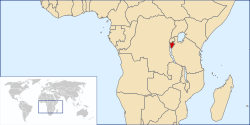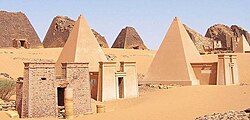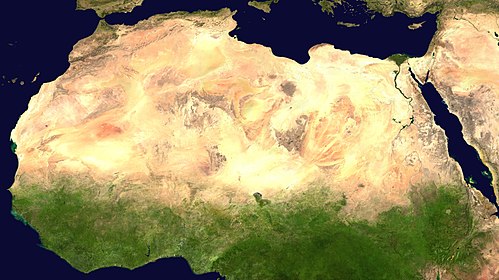Portal:Africa



Africa is the world's second-largest and second-most populous continent after Asia. At about 30.3 million km2 (11.7 million square miles) including adjacent islands, it covers 20% of Earth's land area and 6% of its total surface area. With nearly 1.4 billion people as of 2021, it accounts for about 18% of the world's human population. Africa's population is the youngest among all the continents; the median age in 2012 was 19.7, when the worldwide median age was 30.4. Based on 2024 projections, Africa's population will exceed 3.8 billion people by 2100. Africa is the least wealthy inhabited continent per capita and second-least wealthy by total wealth, ahead of Oceania. Scholars have attributed this to different factors including geography, climate, corruption, colonialism, the Cold War, and neocolonialism. Despite this low concentration of wealth, recent economic expansion and a large and young population make Africa an important economic market in the broader global context, and Africa has a large quantity of natural resources.
Africa is highly biodiverse; it is the continent with the largest number of megafauna species, as it was least affected by the extinction of the Pleistocene megafauna. However, Africa is also heavily affected by a wide range of environmental issues, including desertification, deforestation, water scarcity, and pollution. These entrenched environmental concerns are expected to worsen as climate change impacts Africa. The UN Intergovernmental Panel on Climate Change has identified Africa as the continent most vulnerable to climate change.
The history of Africa is long, complex, and varied, and has often been under-appreciated by the global historical community. In African societies the oral word is revered, and they have generally recorded their history via oral tradition, which has led anthropologists to term them "oral civilisations", contrasted with "literate civilisations" which pride the written word. African culture is rich and diverse both within and between the continent's regions, encompassing art, cuisine, music and dance, religion, and dress.
Africa, particularly Eastern Africa, is widely accepted to be the place of origin of humans and the Hominidae clade, also known as the great apes. The earliest hominids and their ancestors have been dated to around 7 million years ago, and Homo sapiens (modern human) are believed to have originated in Africa 350,000 to 260,000 years ago. In the 4th and 3rd millennia BCE Ancient Egypt, Kerma, Punt, and the Tichitt Tradition emerged in North, East and West Africa, while from 3000 BCE to 500 CE the Bantu expansion swept from modern-day Cameroon through Central, East, and Southern Africa, displacing or absorbing groups such as the Khoisan and Pygmies. Some African empires include Wagadu, Mali, Songhai, Sokoto, Ife, Benin, Asante, the Fatimids, Almoravids, Almohads, Ayyubids, Mamluks, Kongo, Mwene Muji, Luba, Lunda, Kitara, Aksum, Ethiopia, Adal, Ajuran, Kilwa, Sakalava, Imerina, Maravi, Mutapa, Rozvi, Mthwakazi, and Zulu. Despite the predominance of states, many societies were heterarchical and stateless. Slave trades created various diasporas, especially in the Americas. From the late 19th century to early 20th century, driven by the Second Industrial Revolution, most of Africa was rapidly conquered and colonised by European nations, save for Ethiopia and Liberia. European rule had significant impacts on Africa's societies, and colonies were maintained for the purpose of economic exploitation and extraction of natural resources. Most present states emerged from a process of decolonisation following World War II, and established the Organisation of African Unity in 1963, the predecessor to the African Union. The nascent countries decided to keep their colonial borders, with traditional power structures used in governance to varying degrees. (Full article...)
Selected article –
Meroë (/ˈmɛroʊiː/; also spelled Meroe; Meroitic: Medewi; Arabic: مرواه, romanized: Meruwah and مروي, Meruwi; Ancient Greek: Μερόη, romanized: Meróē) was an ancient city on the east bank of the Nile about 6 km north-east of the Kabushiya station near Shendi, Sudan, approximately 200 km north-east of Khartoum. Near the site is a group of villages called Bagrawiyah (Arabic: البجراوية). This city was the capital of the Kingdom of Kush for several centuries from around 590 BC, until its collapse in the 4th century AD. The Kushitic Kingdom of Meroë gave its name to the "Island of Meroë", which was the modern region of Butana, a region bounded by the Nile (from the Atbarah River to Khartoum), the Atbarah and the Blue Nile.
The city of Meroë was on the edge of Butana. There were two other Meroitic cities in Butana: Musawwarat es-Sufra and Naqa. The first of these sites was given the name Meroë by the Persian king Cambyses, in honor of his sister who was called by that name. The city had originally borne the ancient appellation Saba, named after the country's original founder. The eponym Saba, or Seba, is named for one of the sons of Cush (see Genesis 10:7). The presence of numerous Meroitic sites within the western Butana region and on the border of Butana proper is significant to the settlement of the core of the developed region. The orientation of these settlements exhibit the exercise of state power over subsistence production. (Full article...)
Featured pictures –
Did you know (auto-generated) -

- ... that the Philippine embassy in Pretoria responded to a South African newspaper's denunciation of horse fighting in the Philippines by saying that the practice was already illegal?
- ... that Susan Murabana created Africa's first permanent planetarium?
- ... that in South Africa's genocide case against Israel, the International Court of Justice ordered Israel to "punish the direct and public incitement to commit genocide" against Palestinians in Gaza?
- ... that South African civil rights activist Thambi Naidoo was arrested along with Mahatma Gandhi and sent outside of Transvaal for refusing to register?
- ... that enrollment at a school for African-American students in Virginia grew from 14 pupils to 1,300 in its first ten years?
- ... that desert kites in the Middle East and North Africa were used as traps for wild game?
Categories
Selected biography –
Albert John Luthuli (c. 1898 – 21 July 1967) was a South African anti-apartheid activist, traditional leader, and politician who served as the President-General of the African National Congress from 1952 until his death in 1967.
Luthuli was born to a Zulu family in 1898 at a Seventh-day Adventist mission in Bulawayo, Rhodesia (now Zimbabwe). In 1908 he moved to Groutville, where his parents and grandparents had lived, to attend school under the care of his uncle. After graduating from high school with a teaching degree, Luthuli became principal of a small school in Natal where he was the sole teacher. He accepted a government bursary to study for the Higher Teacher's Diploma at Adams College. After the completion of his studies in 1922, he accepted a teaching position at Adams College where he was one of the first African teachers. In 1928, he became the secretary of the Natal Native Teachers' Association, then its president in 1933. (Full article...)
Selected country –
 |
 |
|

| ||
Burundi, officially the Republic of Burundi, is a small country in the Great Lakes region of Africa. It is bordered by Rwanda on the north, Tanzania on the south and east, and the Democratic Republic of the Congo on the west. Although the country is landlocked, much of its western border is adjacent to Lake Tanganyika.
The politics of Burundi take place in a framework of a transitional presidential representative democratic republic, whereby the President of Burundi is both head of state and head of government, and of a multi-party system. Executive power is exercised by the government. Legislative power is vested in both the government and the two chambers of parliament, the Senate and the National Assembly.
Geographically isolated, facing population pressures and having sparse resources, Burundi has the lowest nominal GDP per capita in the world. (Read more...)
Selected city –

Bujumbura (French pronunciation: [buʒumbuʁa]; Kinyarwanda pronunciation: [buʒuᵐbuɾa]), formerly Usumbura, is the economic capital, largest city and main port of Burundi. It ships most of the country's chief export, coffee, as well as cotton and tin ore. Bujumbura was formerly the country's political capital. In late December 2018, Burundian president Pierre Nkurunziza announced that he would follow through on a 2007 promise to return Gitega its former political capital status, with Bujumbura remaining as economical capital and center of commerce. A vote in the Parliament of Burundi made the change official on 16 January 2019, with all branches of government expected to move to Gitega within three years.[needs update] (Full article...)
In the news
- 24 April 2025 – Somali Civil War
- Al-Shabaab militants seize the town of Wargaadhi and its military base in Middle Shabelle, Somalia. More than 40 militants and twelve clan fighters are killed in related combat. (Al Jazeera)
- 24 April 2025 – Islamist insurgency in the Sahel
- The Beninese government announces that 54 soldiers were killed in an attack by Jama'at Nasr al-Islam wal Muslimin (JNIM) in the north of the country last week, after previously announcing only eight soldiers were killed. JNIM claims 70 soldiers were killed in the attack. (BBC)
- 22 April 2025 –
- Interpol rescues 33 West Africans, including people from Benin, Togo, Burkina Faso, and Ghana, from human trafficking rings in the Ivory Coast. (AP)
- 21 April 2025 – Spillover of the Sudanese civil war
- 2025 Nasir clashes
- The South Sudan People's Defence Forces capture the town of Nasir in Upper Nile State from the Nuer White Army. (Reuters)
- 21 April 2025 – Boko Haram insurgency
- The Islamic State claims responsibility for a series of deadly attacks targeting Christians and security forces in Borno and Adamawa, Nigeria earlier this month that killed at least nine people and injured several others. (Reuters)
Updated: 23:05, 24 April 2025
General images -
Africa topics
More did you know –
- ... that at approximately 5,000 years old, the Lothagam North Pillar Site is thought to be the earliest and largest monumental cemetery in eastern Africa?
- ... that a 2020 study found that African countries which allowed foreign funding of NGOs had a higher voter turnout?
- ... that Essop Moosa, who was of Indian origin, became the first non-white player to play for an all-white soccer team in South Africa, appearing under a pseudonym?
- ... that the Seventh German Inner Africa Research Expedition served as cover for a secret First World War espionage mission?
Related portals
Major Religions in Africa
North Africa
West Africa
Central Africa
East Africa
Southern Africa
Associated Wikimedia
The following Wikimedia Foundation sister projects provide more on this subject:
-
Commons
Free media repository -
Wikibooks
Free textbooks and manuals -
Wikidata
Free knowledge base -
Wikinews
Free-content news -
Wikiquote
Collection of quotations -
Wikisource
Free-content library -
Wikispecies
Directory of species -
Wikiversity
Free learning tools -
Wikivoyage
Free travel guide -
Wiktionary
Dictionary and thesaurus



























































































